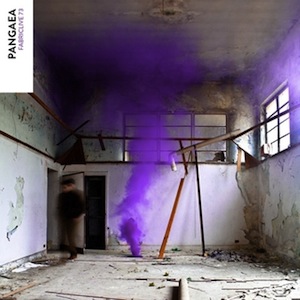Pangaea Fabriclive 73
As one third of the powerhouse Hessle Audio imprint (alongside Ben UFO and Pearson Sound), […]

As one third of the powerhouse Hessle Audio imprint (alongside Ben UFO and Pearson Sound), Pangaea (a.k.a. Kevin McAuley) has spent the last few years amongst the forefront of producers pushing the UK dance music world past dubstep and into a decidedly more hybridized territory. Yet Pangaea by and large hasn’t found the same levels of acclaim that are frequently heaped on both of his fellow label heads. His output doesn’t have the housier tendencies—not to mention the broader appeal—of Pearson Sound, and he similarly lacks the cultural cache and tastemaker status of Ben UFO, and while this has probably led to McAuley being overlooked in a broader sense, it’s something that’s also a reflection of his careful and considered approach to both producing and DJing. His earlier singles, such as “Router” and “Inna Daze,” were key moments where post-dubstep soundsystem music lurched forward and intersected with UK garage and techno, but the producer’s recent material—including last year’s excellent Viaduct EP—has seen him developing a particular brand of idiosyncratic experimentalism, an approach informed equally by techno’s darker recesses and a return to dubstep’s bass heft.
Befitting of his status as Hessle Audio’s dark horse, Pangaea’s Fabriclive 73 mix arrives after extremely well-received outings in the same series from Pearson Sound and Ben UFO. As such, it’s hard not to compare the three releases, and predictably, Pangaea’s initially falls on the unassuming side of things. Featuring tracks from the likes of Lee Gamble, MGUN, Speedy J, and Pev & Kowton, the mix eschews some of the more overt dubstep flirtations of his recent productions in favor of a refined, but still thoroughly UK bass-indebted selection of techno. Fabriclive 73 opens with an as-yet-unreleased track from McAuley himself, “Recreational Slumming,” whose heavy-hitting snares and scratchy exterior offers a sinewy, bastardized take on dub-techno. It sets the tone for the first section of the 76-minute-long mix, which covers the murky territory currently situated between house, techno, garage, dubstep, and jungle.
Unlike the Pearson Sound or Ben UFO entries in the Fabriclive series, Pangaea’s is unique in that it contains only one track from the Hessle Audio catalog—Pearson Sound’s woozily anthemic “Starburst.” Although this arguably has the effect of distancing the mix from the label’s sonic footprint, in many ways it’s indicative of Hessle Audio’s increasingly experimental direction, where off-kilter bass tunes inhabit a sonic territory that’s increasingly similar to Berlin techno. In this respect, it’s little surprise that Fabriclive 73 finds a tune from Ostgut Ton-affiliate Kobosil perfectly segueing into Pev & Kowton’s skittish, synth-laden brand of UK techno.
The mix takes a turn towards more obvious dancefloor fillers when Pangaea drops Exposure’s remix of Speedy J’s “Something for Your Mind,” a walloping slice of early-’90s Belgian techno. Similarly raw, barnstorming sounds from artists such as Bleaching Agent and Alex Falke fill out the rest of the record, reiterating McAuley’s strengths as a club DJ. In some ways, these hard-charging tracks serve as a logical conclusion to the mix’s slowly building narrative, but it’s hard not to lament the blissfully agile melancholy of its first two thirds.
As things currently stand, the UK’s so-called hardcore continuum may not presently be ground zero for underground dance music’s most inventive, forward-thinking output. Nevertheless, Fabriclive 73—much like Ben UFO’s Fabriclive 67—serves as a welcome reminder that although this scene’s progress may no longer be measured in seismic shifts and offer up a new genre every six months, its innovative spirit hasn’t disappeared entirely. There’s an undeniable artfulness to this mix, as Pangaea seamlessly integrates rolling bass tracks, techno’s forward momentum, and intricate, lurching rhythmic interplay. He may be the underdog of Hessle Audio’s founding trio, but Fabriclive 73 has a formidable sense of both style and consistency—qualities that don’t necessarily ooze glamor, but are slowly and steadily carving out new territory in the interstices of rapidly collapsing genres.

